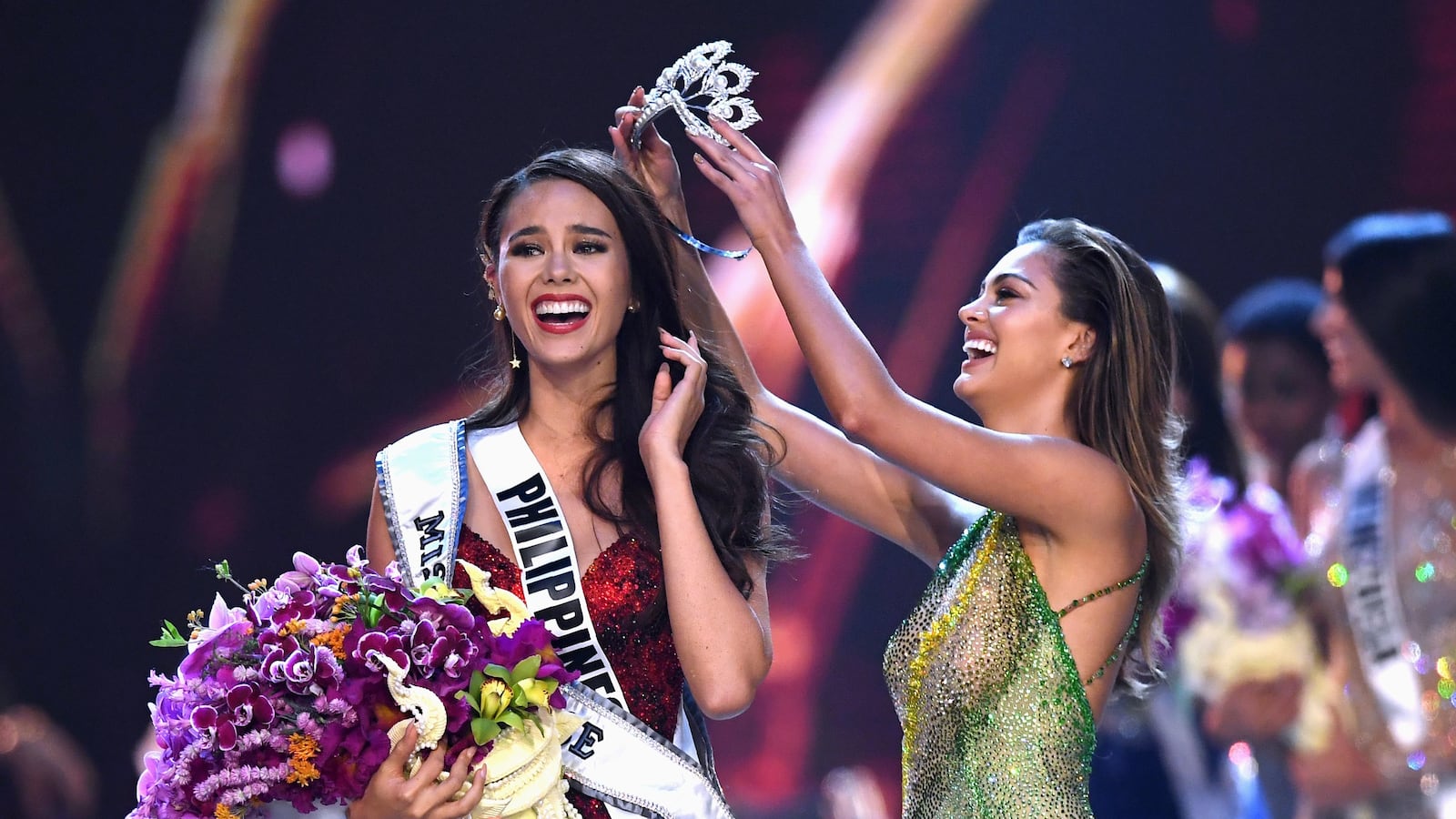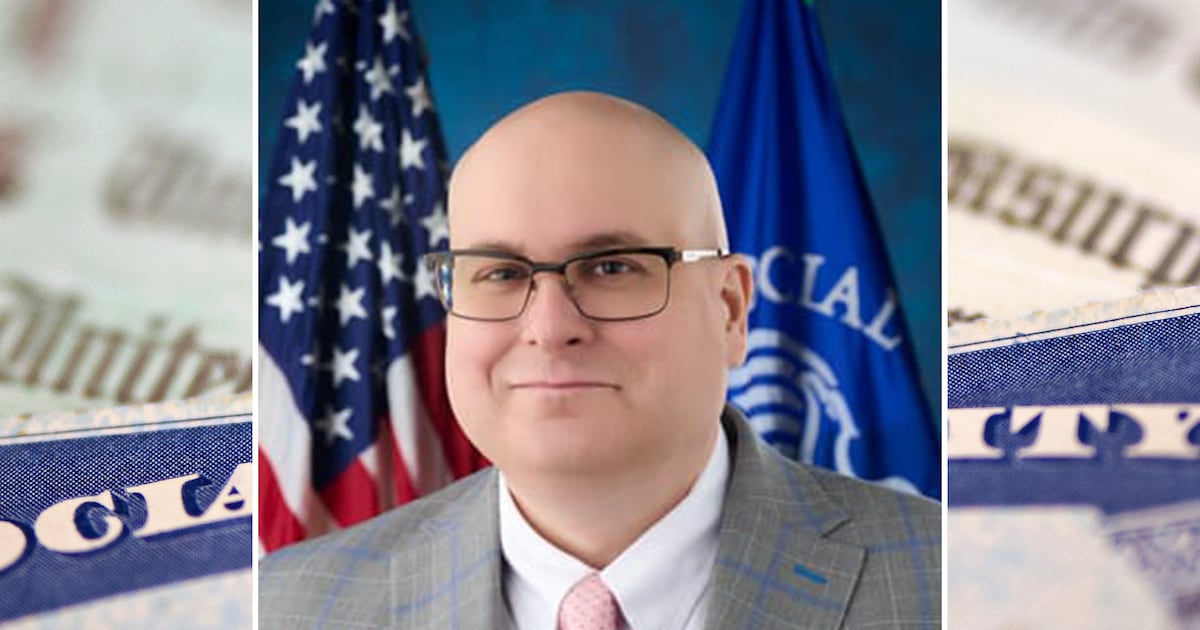With a whopping three-hour runtime, this year’s Miss Universe pageant had it all—bathing suits designed by a Thai princess, an all-female selection committee, Steve Harvey doing a stand-up routine about spicy Thai food, and not one but two live Ne-Yo numbers. Sunday night’s Bangkok-set extravaganza also featured more talking than usual—not from host Harvey, who unfortunately always talks that much—but by the actual contestants.
This unprecedented desire to listen to female contestants instead of just testing their ability to walk in heels is symptomatic of the larger trend of performatively woke beauty pageants. These competitions do not want to accept that they are by definition disqualified from the feminist revolution—nor do they want to stop judging bikini-clad women based on their appearance. Pageants have attempted to compromise and save face with a number of changes, like Miss America’s recent, controversial decision to cut their swimwear round. Miss Universe hasn’t gone that far, but it’s impossible to watch the event without picking up on the number of ways it is attempting to prove its feminist merit.
Like any good pageant queen, Miss Universe knows that the best way to get a message across is to repeat it over and over again. First, there’s Steve Harvey’s smug announcement of an all-female selection committee, featuring leaders in business, entertainment and philanthropy (including Janaye Ingram, a Women’s March leader). Then there’s the fact that every commentator seems to have undergone a very specific training in which they learned how to assess beauty-pageant contestants without actually commenting on their bodies. During the portion of the evening dedicated to watching women walk back and forth in bikinis, Carson Kressley is reduced to repeating that, “the swimsuit competition is all about confidence,” and critiquing women on their general auras. That being said, style commentator Kressley did consistently have the best lines of the night, and got to say things like, “This is a high impact nude illusion look” and “Curacao, Cura-wow!”
Of course, as a woman, the true tragedy of watching Miss Universe isn’t the emphasis on bikini bodies and flawless faces. No, the real injustice is Steve Harvey. Nothing brings home the reality of gender inequality quite like Steve Harvey’s continued employment. Harvey famously failed at this hosting gig in 2015. Not only did he get to come back, but the majority of his shtick now consists of cracking jokes about that time he fucked up. He constantly mispronounces words and names, has confusing exchanges with contestants and is overall not very good at this. Meanwhile, he’s placed in a position of power over a group of exceptional women—lawyers, doctors, activists, engineers, a lot of models—who both walk and talk circles around him. This year, Harvey opened the pageant by complimenting Thailand on its many Thai restaurants. At one point, he had to inform the audience that one of his jokes was, in fact, a joke. Is it even possible to bomb as the Miss Universe host?
After Harvey’s opening monologue, the crowd seemed to cheer up, and the contestants were cut from 94 to the top 20. While Miss USA did not beat out her regional competition, she eventually made it through as a wild card. This is particularly notable because Miss USA, Sarah Rose Summers, was recently at the center of a Miss Universe controversy. While in Thailand, Summers appeared in an Instagram video in which she seemed to call out a number of contestants for not understanding English. Summers issued a lengthy response to the backlash, writing, “In a moment where I intended to admire the courage of a few of my sisters, I said something that I now realize can be perceived as not respectful, and I apologize.”
Miss Spain, Angela Ponce, is another contestant who was trending before Sunday’s pageant. While Ponce did not ultimately make the top 20, she has already made Miss Universe history as the pageant’s first openly trans contestant. In a November Time interview, Ponce explained that, “In 2015, I competed in another pageant, Miss World, in Spain, but I found out on the day of the competition that their rules didn’t allow a transgender woman to win. It crushed me. I had to go on and perform, and it felt horrible. But after I got to the Miss Universe final, Miss World changed their rules too. I changed the rules.”
While Ponce failed to move forward, Miss Universe did take the time to acknowledge her accomplishments, with Ashley Graham narrating a montage about Ponce’s journey to the competition. It was a welcome departure from Miss Universe’s regular video packages, which this year included hair straightener spon con, contestants posing inside Thai temples, and women walking through gauzy curtains while speaking the names of their countries, Miss Vanjie-style.
“Angela Ponce is everything you’d expect from a reigning Miss Universe Spain—she’s smart, driven, beautiful,” Graham intones. “But her path has been anything but ordinary, and nothing short of extraordinary.”
She continues, “Angela is changing history as the first transgender woman to contend for the title of Miss Universe; at a young age, Angela suffered bullying from classmates. But with the love and support of her family, she has faced life with a smile.” Solemn music and hateful headlines flash across the screen, as Graham notes that, “acceptance is still not absolute, even in some corners of the pageant community.” Juxtaposing pageant footage of Ponce with a talking-head interview, Miss Spain emphasizes, “We’re living in a century where we can’t keep repeating patterns of the past. To eradicate intolerance, I think it would be very important to foster those values from a young age.”
“I’m here to represent diversity of humans in the world,” Ponce adds. “My hope is for tomorrow, to be able to live in a world of equality for everyone. Simply for us all to understand that we are humans and we must make all our lives easier together. The reality for many people is going to change. If I can give that to the world, I don’t need to win Miss Universe, I only need to be here.”
At this point in the pageant, Ponce is welcomed to the stage and gets to take a triumphant walk down the runway, to a standing ovation and thunderous applause. It’s a highlight of the show, and a moving respite from the rest of the telecast, which is 80 percent Steve Harvey very slowly explaining the complicated rules of the pageant because he has three hours to fill and fifteen minutes of original material. The irony is that Miss Universe contestants are actually fascinating, and seem to have enough life experience to pull off their own TED conference. Miss South Africa is a tuberculosis survivor, and Miss Great Britain was an aspiring Olympic athlete who suffered an injury only to become a barrister and advocate for victims of acid attacks. Miss Canada is a model/biomedical engineer, Miss South Africa wants better quality medical care for underserved communities, and Miss Costa Rica has a “beautiful relationship with nature!” Oh, and Miss Vietnam rejected her parents’ order to get married at 14 and became a pageant winner instead, and then used her Miss Universe winnings to open a library.
Obviously, it would be insulting to this group of women to ask them a superficial or shallow question. That being said, Miss Universe may have erred too far in the opposite direction this year, asking its top five contestants a number of super-intense questions, ranging from refugee quotas to legalizing marijuana to the importance of a free press (in case you were wondering, Miss Philippines is not a fan of recreational drug use). Not only are contestants given way too little time to tackle these complex topics—their answers are also nestled in between runway rounds and inexplicable Ne-Yo performances.
To round out this tonal whiplash, we are re-introduced to the reigning Miss Universe, Miss South Africa, whose life story includes being hijacked and escaping by punching her attacker in the neck. She does her final lap and waves goodbye to the crown, just in time for Steve Harvey to announce the new Miss Universe: the Philippines’ Catriona Gray.
See you next year, Harvey.




